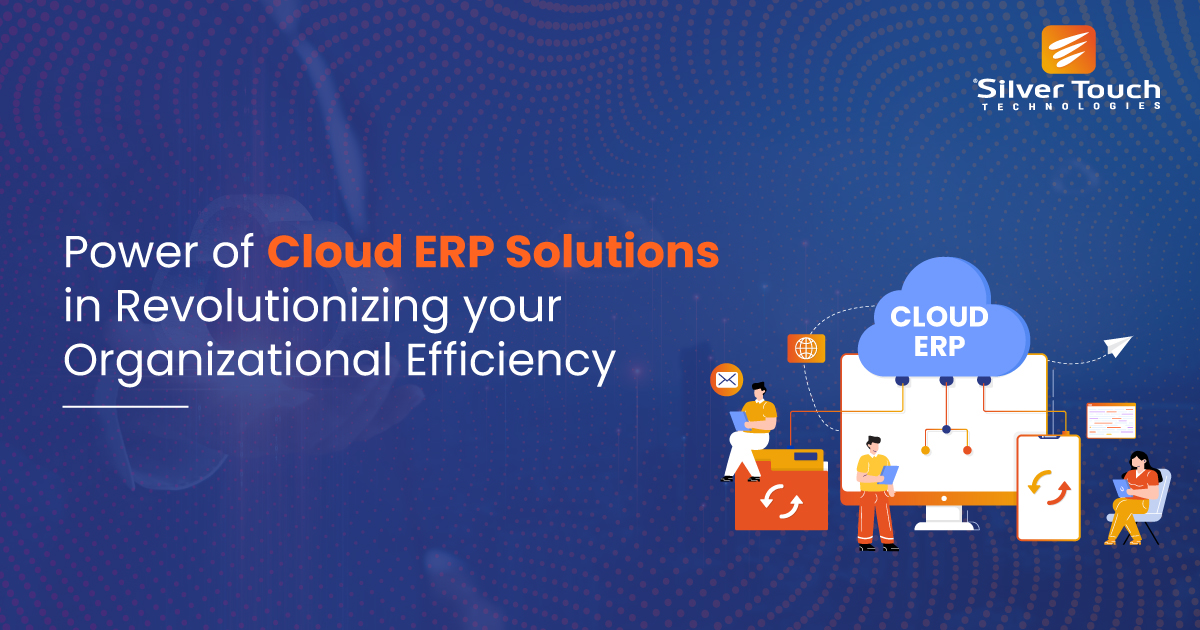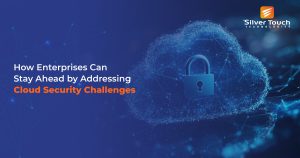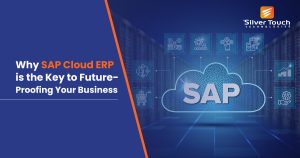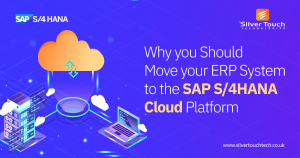With today’s businesses trying to adapt to evolving business requirements and technologies, cloud ERP solutions have become really popular. According to various statistics, 41% of organisations have adopted cloud ERP software, and the rest are planning to do so soon. With cloud ERP solutions in place, companies can have access to their critical business applications from any place and at any time. So, here’s a quick look at what is cloud-based ERP software.
What Is Cloud ERP Software?
Cloud ERP software operates on the provider’s cloud computing platform rather than on-premise in the enterprise’s data centre. This allows companies to access data over the internet seamlessly. The cloud ERP software solutions are mainly designed to integrate all the business processes of an organisation, like HR, accounting, inventory management, and purchasing, into a unified platform.
Cloud ERP systems have the same functionalities as compared to on-prem systems without experiencing any of the downsides like upfront licensing fees. In cloud ERP software, the support and maintenance costs also get eliminated as support is directly provided from the remote data centre. This again makes it a cost-effective option for business.
Components of Cloud ERP Software
Some of the common cloud ERP modules include:
Financials and Accounting
A cloud-based ERP software acts as a centralised platform for managing various finance-related activities. In fact, financial management is regarded as one of the most important functionalities of an ERP system. It comes with multiple tools that are used to store, analyse, and track financial elements like accounts payable, accounts receivable, etc. The cloud ERP solution is also quite helpful in budgeting and forecasting. It can perform tasks like tax management, multicurrency reconciliation, etc.
Inventory Management
The inventory management component of the best cloud ERP software allows companies to optimise their inventory levels and minimise excess stock. The ERP solutions offer business owners real-time inventory data so that they can have greater visibility over their inventory levels. This allows business owners to make well-informed business decisions. They can also ensure that the customer satisfaction rate is maintained.
Human Resource
The HR component of cloud ERP software comes with multiple tools that can streamline various HR tasks like recruitment, hiring, performance evaluation, employment management, payroll processing, etc. The HR module has got a big role to play in managing the records of the employees, tracking their work hours, leaves and much more. This consolidated data helps reduce errors and the risk of duplication of records. A proper HR component also allows businesses to optimise their workforces.
Customer Relationship Management
The CRM component of cloud ERP software for small businesses is mainly used to analyse customer data like contact details, purchase history, and service records on one platform. This data can offer the customers better service and develop improved relationships with them. The CRM component is leveraged by the sales and marketing team to access real-time customer data and understand customer behaviour and sales platform.
Types of Cloud ERP Software
Here are some of the major types of cloud ERP software:
Multi-tenant SaaS
The multi-tenant SaaS is a single code base that is shared among different customers. The ERP provider manages all the maintenance and upgrade activities from time to time. These multi-tenant SaaS solutions are more affordable. With multi-tenant SaaS, all the users can be on the latest version of the system, which has all the security patches, bug fixes, and the latest features.
Single-tenant SaaS
Single-tenant SAS is mostly used by larger companies. Each customer has access to the database and the code base. The provider is responsible for managing the maintenance and upgrades for each of the customers. The Single-tenant SaaS solutions also allow companies to have greater control over their business processes and data.
Public Cloud
Here, the cloud provider owns the infrastructure, while the customers access it over the internet. Public clouds are mostly less expensive. However, there are chances of security breaches. So, it is important to ensure that the data is encrypted both at rest and in transit while using a public cloud.
Private Cloud
In a private cloud, the customer owns the infrastructure while the cloud provider manages it. Private clouds are comparatively more expensive. However, these cloud systems offer better security. They are mostly used by companies that have bulk sensitive data. The cloud systems are not shared with other customers. So, complete data security is maintained, and the chances of data breaches are minimised.
Hybrid Cloud
This type of cloud solution combines the benefits of both public and private clouds. In hybrid clouds, the users can easily keep sensitive data on the private cloud, and the less sensitive data is stored on the public cloud. So, it can be said that a hybrid cloud allows users to store data securely without having to spend a lot of money on the same.
Benefits of Cloud ERP Software
You May Also Like to Read: Cloud ERP vs On-Premise ERP – Choose the Best ERP for Your Business
The are multiple benefits of cloud ERP software, such as:
Lower Costs: Cloud-based ERP solutions help companies in reducing their operational costs. There are no upfront purchase costs involved. The ongoing IT costs are also lowered as maintenance and upgrades are directly handled by the service providers.
Increased Scope for Automation: The best cloud ERP software offers users a greater scope for automation. The users are easily able to automate the workflows and gain new efficiencies across the various departments of their business.
Greater Security: With cloud ERP software in the UK, data backups and disaster recovery are handled with the utmost care. This makes the systems extremely secure. There are minimum chances of security breaches, and the vulnerabilities are also mitigated really fast.
Fast Implementation: The cloud ERP system can be implemented in an existing business structure really fast. The implementation is a lot faster than on-prem deployment. The applications can also be configured easily. This speeds up the time to productivity.
Enhanced Scalability: Nowadays, it has become really important for businesses to use easily scalable software solutions. With cloud ERP solutions, companies can easily add additional computational power or data storage capacity as and when required. This saves businesses from incurring a huge capital expense.
Cloud ERP vs. On-Premises ERP
When choosing ERP solutions, the most important decision that businesses need to make is whether to go for cloud ERP or on-prem ERP solutions. So here are a few things points of differences between cloud ERP and on-prem ERP solutions that will allow business owners to decide for themselves:
Cost-effectiveness
On-prem ERP solutions require a considerable upfront investment to set up the required infrastructure and proceed with the deployment phase. Additional staff is also required to operate and maintain the system.
Cloud ERP software implementation does not require any such a front investment as the infrastructure and deployment are taken care of by the provider. The service provider is also responsible for maintaining the system.
Implementation
The implementation of on-prem ERP solutions is done by the company itself, so the process may take a significant amount of time. In most cases, the implementation takes as long as 6 months.
The implementation process of the cloud ERP software in the UK is much faster, given you have chosen the right implementation partner. The entire process can be completed within 2 to 3 months. Advanced functionalities can also be added without any difficulty.
Data Security
In the case of on-prem ERP systems, the organisation has complete control over data. This requires them to be more cautious about their data security policies.
In cloud ERP software, the company’s data is accessed through browser applications. This means that various encryption techniques and security policies are used on the data, making it more secure.
Scalability
The scalability capacity of on-prem ERP systems is mostly related to hardware. So, companies need to plan the growth of their business and expand the system accordingly.
Cloud ERP systems come with auto-scaling features. So, the company has the liberty to scale its systems as and when required without any hindrance.
Get SAP ERP Software to Streamline Your Business Modules
SAP Cloud ERP: Harness the Power of Cloud for ERP Success
SAP cloud ERP is a ready-to-run cloud ERP solution that allows companies to make the most out of cloud ERP. SAP Cloud ERP offers scope for continuous innovation. It also delivers the best industrial practices. With SAP cloud ERP solutions, businesses will be able to redefine their workflows and rebuild their business models. They can also make use of pre-configured processes to run their businesses smoothly.
How Can Silver Touch Help Your Business By Providing Cloud ERP
Silver Touch Technologies has been helping businesses transform their operations with cloud ERP solutions for quite a while now. With Silver Touch Technologies as their ERP cloud implementation partner, businesses can easily make the most out of the cloud and pave the path to business success. The experts at Silver Touch are well aware of the latest technology trends and the best industrial practices, and they will implement cloud ERP software for small businesses based on their exact business needs. They will also ensure that the security aspects are considered during the cloud ERP implementation process.
In this way, cloud ERP software solutions have already become a crucial part of businesses these days. As time progresses and technology continues to evolve, we will see more companies switching to cloud ERPs. So, if you have still not experienced the benefits of cloud ERP, get in touch with the experts at SilverTouch and opt for their services. Contact us for more details.
FAQs about Cloud ERP Software
Cloud ERP solutions are hosted in the cloud and managed by the provider, while on-premises solutions are hosted in-house. The company takes care of all the necessary maintenance and upgrades.
Cloud ERP solutions come with advanced data protection features. This keeps your data safe at all times.





